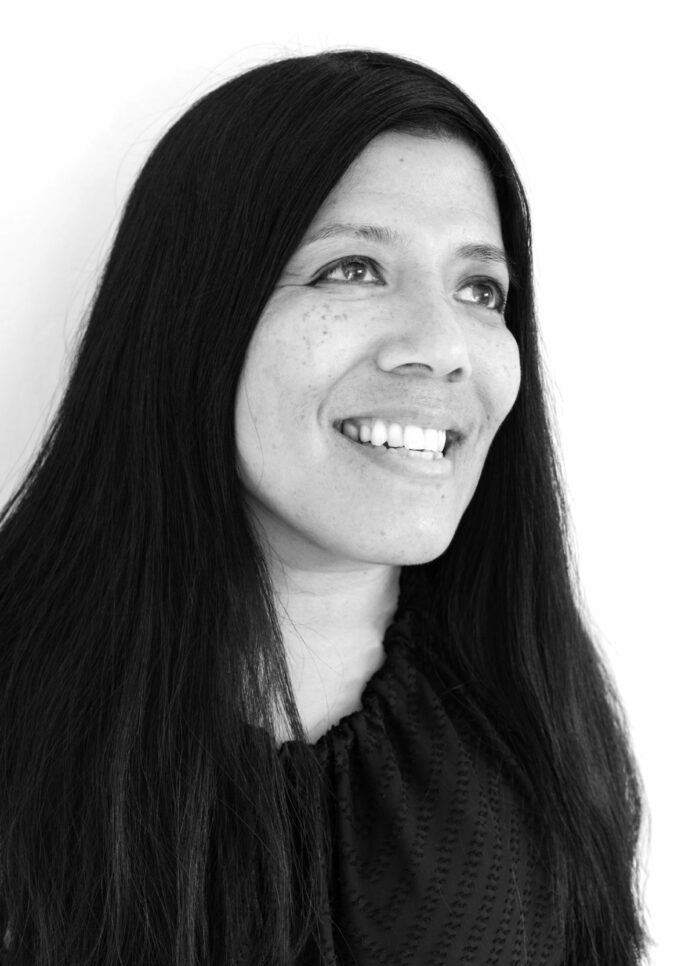A conversation with poet Maw Shein Win.
by Noah Sanders
El Cerrito-based poet Maw Shein Win recently released her second full-length collection of poetry. Storage Unit for the Spirit House (Omnidawn 2020) is a study of containers—storage units, human bodies, prisons, photographs—the ungainly, sometimes organic boxes in which our lives are stored. We sat down with her to talk about where the idea for the book came from, “serial collaboration,” how the LA post-punk rock scene influenced her, and much, much more.
Listen to Maw Shein Win read “Spirit House (six)” from her collection Storage Unit for the Spirit House (Omnidawn 2020).
Spirit House (six)
the nats had moved into the house on Inya Lake
zoomed through halls with pocket knives,
tamarind seeds, green bananas
family offerings of jade bracelets, cheroot cigars, deer tails
the medium danced wildly in the living room, drunk on palm wine
spinning, spinning
orchestra of circle drums & copper bells played on the staircase
nat pwe
eight children on the floorboards, leaping over uncles & cousins
shaking, shaking
mother lit candles on the wall shrine
she spoke to the blue winged insects
they whispered back
a nat warmed itself by the flame
auntie walked in a dream state
hot room
cousin slowly opened a large trunk of teak & silver strips
the nats flew inside, one after the other after the other
NOAH SANDERS:
What was the impetus for writing Storage Unit for the Spirit House?
MAW SHEIN WIN:
My partner Tom Scandura and I were in the process of moving and in transit trying to find a place to live. During that process, we got rid of a lot of stuff from when we lived in Berkeley. Whatever we had left, mainly books, records, and art, we kept in storage units. So I started thinking and writing about storage units. And then became a bit obsessed with them. I started researching storage units, looking up articles, hearing stories about people who had lived in storage units because they didn’t have a place to live. People started reaching out to me and telling me their own stories about storage units. I even thought that when my book came out I could have a party at Bridge Storage and ArtSpace in Richmond.
NS:
That is such a great idea.
MSW:
I was already envisioning it in my mind–bands, a party—I thought it’d be a blast. Then, the pandemic happened.
NS:
You should write a sequel just so you can do that.
MSW:
I love that idea. I continued to work on these poems, writing about cinemas, theaters, cellars, and hospitals. Yet I realized there was an element missing from the collection. My parents are from Burma/ Myanmar, and I started thinking about the spirit houses I had seen when I visited my family there. I had been considering different forms of architecture and when the spirit houses came to mind, I thought, “That’s it.”
NS:
In some Buddhist beliefs, spirit houses are built as a way to appease these sometimes troublesome spirits called nats that you thread throughout the book. How do you see your relationship with the nats?
MSW:
My siblings and I were raised Buddhist, but not necessarily along with the nat belief system. I learned about the nat spirits later when I visited our family in Burma. I remember being intrigued and fascinated because it seemed like there were so many mythologies and stories. Rich and sometimes brutal. The idea of how these spirits could affect the living. I started thinking in a more personal way, what if the nat spirits entered my own family’s life? Some of the poems in the collection address this possibility.
NS:
Your poetry has this beautifully sparse feeling to it, like your descriptions are the mise-en-scene of a film frame with the actual story happening between the lines.
MSW:
I love film. If someone asked for a primary influence, I would say cinema. The language and vocabulary and the ways of thinking and looking and talking about film has become a major inspiration for poems, past and present.
NS:
What is your process for writing poetry?
MSW:
I write by hand first. I write for minutes, hours, take notes, sometimes do stream of consciousness. I have many notebooks and random pieces of paper everywhere filled with notes. Stacks of paper everywhere. Poor Tom. I’ll return and type up what appeals. And then I slash and burn while revising, hence the reason why many poems tend to be spare. Another part of my process is giving readings. When I prepare for a reading, I’ll read my poems aloud and may change words or lines then. Recently, I’ve been writing dream logs. I’m not sure yet how they’re working. People say, “Oh, dreams.”
NS:
I hate it when people say that. Dreams are awesome. Every time I write about dreams, I’m like, this is the craziest shit I’ve written about in days.
MSW:
I know! I have a super active dream life and I remember many of my dreams. So I’m like, “Damn, I’m writing them down.”
NS:
It’s like a free story gift from your subconscious.
MSW:
It’s such a deep source, if you can remember them.
NS:
You’re sometimes described as a ‘serial collaborator.’ How does this affect your own work?
MSW:
As a collaborator and teacher, I’m always learning from people. I’m not that writer who’s solo. I’m interested in all the arts, music, film, and dance. And I think that even if it doesn’t come out directly in my work, the part of myself that loves to collaborate across genres and disciplines definitely affects my work.
NS:
You’ve lived and collaborated in the Bay Area for a long time. How has that affected your work?
MSW:
I lived in Los Angeles for a long time. I was born in Massachusetts. Then we moved to New York. Then to Allentown, Pennsylvania; Grand Junction, Colorado; Sparks, Nevada; and then Orange County. Later, I lived in Long Beach and Los Angeles, finally moving to the Bay Area in the 90s.
NS:
You lived in Sparks, Nevada?
MSW:
I’ve actually written a lot about living in Sparks. I finally went back as an adult, and I was kind of horrified. While living in Southern California, I was into the poetry scene. I’d often come up to San Francisco—and I know this sounds cliche—but I’d go to City Lights Books and think, “Someday I have to live in San Francisco.” My younger sister reached out, told me she was going to India with her boyfriend for a year and asked if I wanted to rent her apartment in the Castro for $300 dollars. Even though I had a good teaching job, was living with dear friends, and playing in a band, I thought it was a sign. I decided to move up here and was fortunate because I already had friends who lived here. So I knew some folks, and I was able to meet a lot of people. I feel like the Bay Area and the different communities I’ve been involved with, and are still involved with, has certainly inspired my writing.
NS:
The band you were in was a punk rock band right? Do your punk rock roots still show up in your poetry?
MSW:
There’s this term I love—“art damage.” I was more into art punk and post-punk. There was this club I pretty much lived at in LA called the Anti Club. The Minutemen would play there and a lot of great weird bands. Almost three nights a week, we would go to shows, and then eventually formed Pearls Before Swine more out of fun than anything else.
NS:
Do you consider your poems experimental?
MSW:
I’m not an experimental poet in the sense of the truly experimental poets, but I’ve been influenced by art that would fall under the category of experimental. I remember being influenced by experimental music and art as a young person and felt drawn in that direction. When someone talks about a poet who writes in unusual forms or in made up languages, I’m curious to check out their work. One of the things I’m doing right now with my best friend artist Mark Dutcher [ed: illustrator for Storage Unit for the Spirit House] are two-word poems. I’ll send him a two-word poem, and he’ll do a painting inspired by it.
NS:
Two word poetry is experimental though, right?
MSW:
Well, I think there are one-word poems. And one sentence poems. Sometimes I tell my students: “Create your own forms.” I studied poetry, but I feel that experimenting with music and performance art while still doing poetry was really freeing for me.
NS:
I love that. As someone who tries to write poetry but has no formal training in poetry, I always wonder, “What does it look like for someone whose influences aren’t poetry to write poetry?”
MSW:
It’s kind of exciting. You’re not coming from solely a workshop background and not worrying about, “What are other people going to think?” In a way, you’re in this wonderful situation of being able to say, I’m just creating my own poetry world. ♦
Noah Sanders can’t remember exactly how long he’s lived in San Francisco. Time can get pretty soupy when you go that far back. Founding editor of the literary publication The Racket Journal, he lives near Precita Park with his fiancée and their deceptively handsome dog, Arlo.



